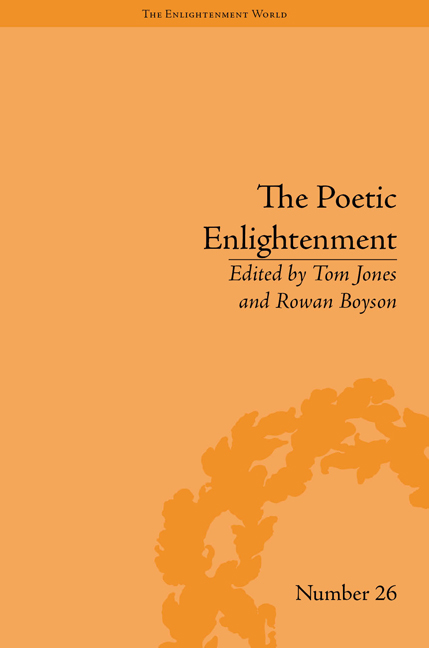Book contents
- Frontmatter
- CONTENTS
- Acknowledgements
- List of Contributors
- General Introduction
- I Poetic Knowledge and the Knowledge of Poetry
- II Poetic Theories of the Social Self
- III Enlightenment and Romantic Poetologies
- 10 Introduction: Poetry and/or Enlightenment
- 11 James Thomson's The Seasons and the Transformative Potential of Poetry in the Early Scottish Enlightenment
- 12 ‘Furnishing Light’: Wordsworth, Poetry and the Science of Man in Enlightenment Scotland
- 13 Wordsworth, Kant, Fanaticism and Humanity
- Notes
- Index
13 - Wordsworth, Kant, Fanaticism and Humanity
from III - Enlightenment and Romantic Poetologies
- Frontmatter
- CONTENTS
- Acknowledgements
- List of Contributors
- General Introduction
- I Poetic Knowledge and the Knowledge of Poetry
- II Poetic Theories of the Social Self
- III Enlightenment and Romantic Poetologies
- 10 Introduction: Poetry and/or Enlightenment
- 11 James Thomson's The Seasons and the Transformative Potential of Poetry in the Early Scottish Enlightenment
- 12 ‘Furnishing Light’: Wordsworth, Poetry and the Science of Man in Enlightenment Scotland
- 13 Wordsworth, Kant, Fanaticism and Humanity
- Notes
- Index
Summary
I stood, and leaning o'er the Garden wall,
Reviewed that Woman's sufferings; and it seemed
To comfort me while with a Brother's love
I bless'd her – in the impotence of grief.
At length towards the cottage I returned
Fondly, – and traced, with interest more mild,
That secret spirit of humanity
Which, mid the calm oblivious tendencies
Of Nature, mid her plants, and weeds, and flowers,
And silent overgrowings, still survived.
Superstitious religion bases itself on a principle of subjecting reason to the delusion of perceptions.
In exaltation [Schwärmerey] human beings raise themselves above humanity.
In the Critique of Judgement Kant defines Humanity [Humanität] as ‘both the universal feeling of sympathy, and the ability to engage universally in very intimate communication’. The universalism of human feeling and communicative capacity that characterize humanity, he further argues, distinguishes mankind [Menscheit] from ‘the limitation [characteristic] of animals’. Humanity suggests mankind's predisposition to transform itself into a moral whole. It produces in the individual ‘signs’ of a predisposition towards the morally good; thus ‘to take a direct interest in the beauty of nature … is always a mark of a good soul’. Humanity, for Kant, marks a middle path between the subjection of reason to delusive perceptions in superstitious religion and the raising up of individual human beings in flights of exaltation. Yet despite, or perhaps because of Kant's commitment to the universal, morally progressive tendencies of humanity, some of his earliest readers felt justified in claiming that his critical philosophy contained symptoms of its own tendency towards exaltation or fanaticism. And certainly, in Kant's response to the French Revolution, the universal communicative power of humanity that he celebrates in the Critique of Judgement became a means for him to exercise a ‘sympathy bordering on enthusiasm’ with the events in France.
- Type
- Chapter
- Information
- The Poetic EnlightenmentPoetry and Human Science, 1650–1820, pp. 153 - 168Publisher: Pickering & ChattoFirst published in: 2014

